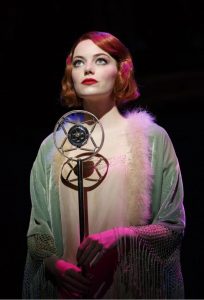Life is A Cabaret! A Comparison of Performences and Media
What I adore most about a good story are the myriads of characters and adventure that live between its pages, creating the magic of places both real and imaginative at my fingertips. Frankly, many of the people I’m introduced to through this avenue are lost to time, their names and stories blend too easily into one another, and I forget them. At the same time, however, there are characters unforgettable down to the smallest detail. When I first opened Isherwood’s Goodbye to Berlin, I walked into pre-nazi Germany and met such a character: the beautiful Sally Bowles.

Emma Stone as Sally Bowles

Michelle Williams as Sally Bowles
Isherwood writes life into Sally, introducing her as she was originally designed to be: messy, striking, and memorable. Sally’s confinement to these pages gave me the power to construct my own image of her; Isherwood’s detail provided an outline, a line drawing of a person I could color in. In this way, books are the most magical thing a person can own. The medium of using the written word to tell a story provides unmatchable precision: for every copy of a book that is sold, opened, and read, lies the exact same combination of words on each page. The language used inside a book is never without meaning, and therefore the message relayed is always the same. The very same Sally Bowles that I met in Goodbye to Berlin will be the exact same woman a stranger will meet when they read the book, and she will still be the same woman should I open the book fifteen years from now. Though my interpretation of Sally is subject to change, the message of the book is steadfast.
Goodbye to Berlin gave me full access to Sally as she was written. I could move forwards and backwards in her story by flipping just a page, and witness all of her endeavors as she had them. The medium that a book provides is omnipotence, providing complete control over what you take in and observe. Read closely, you’ll discover the messages laid out to you from the author. Read passively, and you can skim the surface of the story and leave just as satisfied.
Unfortunately, the same cannot be said about the stories relayed by the theatre. No theatrical production is ever the same; even nightly, the same theatre company tweaks their song and dance, lines and body language edit between shows, making perfect replication an impossible feat. This isn’t to say that the medium of live stage is not also beautiful. Theatre has the fluidity to create impact that the book cannot. Where the book gives you the mind and reasoning of the characters inside, the theatre trades that in for a physical body. The Sally I saw in Davidson’s performance of Cabaret was not Isherwood’s Sally in Goodbye to Berlin, but a new woman entirely, reborn each night with each subsequent performance.
Even so, the Sally I saw live on stage at Davidson is not the same Sally in Cabaret’s past. The medium that theatre provides is the ability to alter the written word by speaking or singing it aloud, which in turn has the ability to change the message entirely. Performances of the same song (Cabaret) by Emma Stone and Michelle Williams exemplify this. Each woman played Sally live on stage, but both of their Sally’s were very different women.
Stone’s performance of Cabaret is my favorite, and you can read her own thoughts on her Cabaret here. The spotlight closes in on her face purposefully, forcing the eye of the audience to focus solely on her as she recounts a painful past that shapes her character. Stone’s voice breaks intentionally while shedding a tear, relaying to the audience her heartbreak. But Sally still lives in the facade of her cabaret, and continues to smile and perform, despite her friend’s death. Alex Needham of The Guardian reviewed this version of Sally by saying “Stone’s interpretation is more fragile and hesitant,” and we see her fragility especially in this song. Stone’s Sally had an airier voice, lithe body language, and was more girl-like. In singing “Cabaret”, we see this as she mock belts notes, her exasperation evident as she grabs the microphone and pushes the song forward.
Michelle William’s Sally was almost a different woman entirely.
Whereas Stone feigned a happiness as Sally for her audience, Williams was visibly bitter. Sally chose the cabaret because it is the life she knows, and Williams delivers the emotional anger and scorn Sally felt over the neighbor’s cruel comments that Emma chose not to, relaying a very different message to the audience. Stone set the stage for the continuation of Sally’s facade, but Williams broke the facade for the song, leaving it up to the audience’s interpretation and engaging in one of the most beautiful aspects of theatre: ambiguity. Like in Stone’s performance, the spotlight shows only Williams’ face, focussing the audience to her expression. Unlike stone, however, Williams was more stoic, with a huskier voice and tight lip.
Though their lines and lyrics were the same, Emma Stone and Michelle Williams gave radically different performances of the same character, and both women impacted their audiences in different ways. Both women breathed a life into Sally by embodying her, but where Stone gave us a Sally still trapped in her facade, Williams gave us a version of Sally aware and bitter. Unlike the Sally living between the pages of Goodbye to Berlin, this Sally is reborn over again with each new actress under the spotlight, transforming the message to the audience by the emotion used to portray her character. Though the lines stay the same, tone and inflection make all the difference, and the rest is up for interpretation.
Citation
“Cabaret – Emma Stone.” YouTube. YouTube, 30 Oct. 2015. Web. 06 Apr. 2017. <https://www.youtube.com/watch?v=9m0rcAFU-FQ>.
“Cabaret – Michelle Williams [Cabaret, March 2014].” YouTube. YouTube, 01 Dec. 2015. Web. 06 Apr. 2017. <https://www.youtube.com/watch?v=oyBi3IuANiE>.
“Emma Stone as Sally.” N.p., n.d. Web. <https://s-media-cache-ak0.pinimg.com/736x/32/0e/4a/320e4afff3ed23f72feddafffc969995.jpg>.
Isherwood, Christopher. Goodbye to Berlin. London: Hogarth, 1960. Print.
“Michelle Williams as Sally.” N.p., n.d. Web. <http://cdn4.thr.com/sites/default/files/2014/04/michelle_williams_cabaret.jpg>.
Needham, Alex. “Emma Stone in Cabaret Review – a Fragile Sally Bowles.” The Guardian. Guardian News and Media, 12 Nov. 2014. Web. 06 Apr. 2017. <https://www.theguardian.com/stage/2014/nov/12/emma-stone-cabaret-review-fragile-sally-bowles>.
Smith, Nigel M. “Don’t Love Emma Stone Yet? This Interview Will Fix That.” IndieWire. N.p., 13 Nov. 2014. Web. 13 Apr. 2017. <http://www.indiewire.com/2014/11/dont-love-emma-stone-yet-this-interview-will-fix-that-68047/>.

Mary,
I really enjoyed reading your post because of how easy it was to follow your thesis and the analysis you used to qualify it. The clips you chose to integrate into your analysis do an excellent job of visually portraying your point, thus further solidifying your argument. Awesome job!
However, I think the first part of your post about how books can be more helpful in solidifying a character might have been a bit too wordy. I think it works well for an introduction into the real meat of your post, but if you trimmed it down some it could still be just as effective and even more precise. My question for you is how do you think the different theatrical portrayals of Sally in Cabaret has changed over time? Do you think it even has changed with time or do you think the different renditions of her character don’t really have ties to different cultural and historical shifts?
UX Feedback-The featured image and first paragraph could be formatted differently to make the post more visually appealing. Overall, your post was very entertaining, largely due to the videos of the different interpretations of Sally Bowles that you strategically integrated into your argument.
Hi Mary,
I didn’t realize that we wrote about the same things! Emma Stone’s performance of the song is my favourite as well – her acting skills truly shine and that’s how I imagined Sally to be like in real life.
I liked how you recorded your impression of Isherwood’s Sally, and highlighted how it was so different from the theatrical interpretation of Sally. I agree that the Sally on Davidson’s stage was a completely different character from the Sally in other productions, in the book, or even in the film.
Something that might be beneficial, which is what I’m also planning to do, is incorporate quotes or outline exactly who Sally is in the book.
Something to think about is how can we make make our posts a little different from each other! Haha – we can talk about it in class!
Pingback: people playing sex games